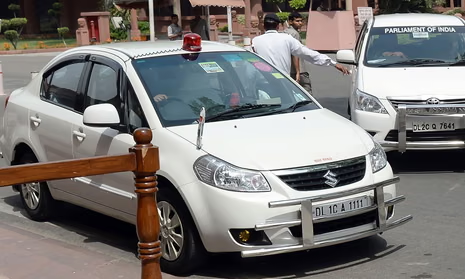
The proliferation of unauthorized VIP security details in Punjab has become a troubling symbol of social pretension and lawlessness. Across the state, a disturbing trend has emerged where individuals with dubious credentials—immigration consultants, real estate agents, and local fixers—parade through public spaces with private security personnel dressed to mimic legitimate law enforcement or official protection units.
These fake security convoys typically feature guards in distinctive uniforms: grey safari suits paired with maroon turbans, or camouflage pants with black t-shirts, deliberately styled to resemble plainclothes police officers or actual VIP protection teams. Private vehicles often accompany these processions as makeshift “pilot” cars, further creating the illusion of official status. This theatrical display serves multiple purposes for those who employ it—projecting power, intimidating rivals, and creating an aura of importance that their actual social or professional standing doesn’t warrant.
The implications extend far beyond mere social posturing. Recent incidents, including reports of confrontations near religious sites like Sohana Gurudwara, have exposed the dangerous edge to this phenomenon. Videos circulating on social media show individuals in these fake security details threatening ordinary citizens with firearms, using their manufactured authority to bully and intimidate. When common people question or obstruct these unauthorized convoys, they face verbal abuse and physical threats, creating an atmosphere of fear and impunity.
This trend raises serious questions about law enforcement oversight and the regulation of private security services. Legitimate VIP protection is a tightly controlled service reserved for specific officials and individuals facing genuine security threats. The widespread mimicry of these protocols by private citizens represents not just a violation of protocols but potentially breaks laws regarding impersonation of security personnel and illegal display of weapons.
The phenomenon also reflects deeper social issues within Punjab’s rapidly changing economic landscape. As new money flows through immigration consulting, real estate speculation, and other businesses, some individuals seek visible markers of status that traditional wealth indicators don’t immediately provide. The fake VIP security detail becomes a shortcut to respect and deference in a society that still values displays of power.
Addressing this requires coordinated action: stricter licensing and monitoring of private security firms, stronger enforcement against impersonation and illegal weapons display, and perhaps most importantly, a cultural shift away from celebrating these ostentatious displays of manufactured power. Until authorities take decisive action and society collectively rejects this theater of intimidation, the streets of Punjab will continue to witness this dangerous charade, with ordinary citizens paying the price for others’ vanity and insecurity.